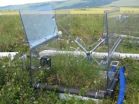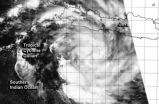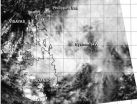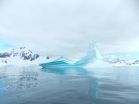(Press-News.org) The climate is warming in the arctic at twice the rate of the rest of the globe creating a longer growing season and increased plant growth, which captures atmospheric carbon, and thawing permafrost, which releases carbon into the atmosphere. Woods Hole Research Center (WHRC) Assistant Scientist Sue Natali and colleagues engineered first-of-a-kind warming experiments in the field to determine net gains or losses in carbon emissions. The study entitled "Permafrost degradation stimulates carbon loss from experimentally warmed tundra," published in the journal Ecology found that growing season gains do not offset carbon emissions from permafrost thaw.
According to Dr. Natali, "Our results show that while permafrost degradation increased carbon uptake during the growing season, in line with decadal trends of 'greening' tundra, warming and permafrost thaw also enhanced winter respiration, which doubled annual carbon losses."
Permafrost contains three to seven times the amount of carbon sequestered in tropical forests. The warming climate threatens to thaw permafrost, which will result in the release of carbon dioxide and methane into the atmosphere creating feedbacks to climate change – more warming and greater permafrost thaw. Prior to this study, "the understanding of permafrost feedbacks to climate change had been limited by a lack of data examining warming effects on both vegetation and permafrost carbon simultaneously," said Dr. Natali.
This study measured CO2 emissions from permafrost thaw and its impact on the carbon balance on an ecosystem level. According to Dr. Natali, "There is 100 times more carbon stored belowground than aboveground in the arctic, so observed changes in plant productivity are only a very small component of the story. Given the amount of carbon stored belowground in the arctic, it is very unlikely that plant growth can ever fully offset C losses from permafrost thaw."
The three year long Carbon in Permafrost Experimental Heating Research (CiPEHR) project warmed air and soil and thawed permafrost using two warming experiments. The "winter warming" treatment consisted of snow packs, which functioned like down comforters insulating the ground during the winter until the snow was removed at the start of the growing season. The "summer warming" treatment consisted of open-topped greenhouses that warmed the air during the summer. The team measured warming effects on CO2 uptake by plants and release by plants and microbes.
Scientists estimate that within the next century permafrost will have declined 30% to 70% and there is limited accounting of how much carbon is stored in these frozen soils or the rate at which it will be released. For Dr. Natali:
"The only way we can accurately project future climate is to understand the responses of both plants and microbes to a warming climate. This study was the first to simulate whole ecosystem warming in the arctic, including permafrost degradation, similar to what is projected to happen as a result of climate change. There is a strong potential for significant global carbon emissions if rates calculated here become typical for permafrost ecosystems in a warmer world."
INFORMATION:
Permafrost thaw: No upside
2014-03-21
ELSE PRESS RELEASES FROM THIS DATE:
Stem cell findings may offer answers for some bladder defects and disease
2014-03-21
(SACRAMENTO, Calif.) — For the first time, scientists have succeeded in coaxing laboratory cultures of human stem cells to develop into the specialized, unique cells needed to repair a patient's defective or diseased bladder.
The breakthrough, developed at the UC Davis Institute for Regenerative Cures and published today in the scientific journal Stem Cells Translational Medicine, is significant because it provides a pathway to regenerate replacement bladder tissue for patients whose bladders are too small or do not function properly, such as children with spina bifida ...
Keck Medicine of USC research may point to better predictor of prostate cancer survival
2014-03-21
New research by USC Norris Comprehensive Cancer Center scientists demonstrates that measuring circulating tumor cells (CTCs) – the cells that spread cancer through the body – may be a better predictor of patient survival than the prostate specific antigen (PSA).
The research was published March 10, 2014 in the Journal of Clinical Oncology by a team led by Amir Goldkorn, M.D., assistant professor of medicine at USC Norris, part of Keck Medicine of USC. Goldkorn's team discovered that elevated CTC counts after chemotherapy indicated as much as a five-fold higher risk of ...
Cold snare polypectomy effective for removal of small colorectal polyps in patients on anticoagulants
2014-03-21
DOWNERS GROVE, Ill. – March 21, 2014 – In recognition of National Colorectal Cancer Awareness Month, GIE: Gastrointestinal Endoscopy has published a special issue for March on colorectal cancer. The issue includes a new study that compares cold snare polypectomy with conventional polypectomy for the removal of small colorectal polyps in anticoagulated patients. The study showed that delayed bleeding requiring hemostasis (stoppage of bleeding) occurred significantly less often after cold snare polypectomy than during conventional polypectomy despite continuation of anticoagulants. ...
Genetic signature reveals new way to classify gum disease
2014-03-21
NEW YORK, NY (March 21, 2014) — Researchers at Columbia University Medical Center (CUMC) have devised a new system for classifying periodontal disease based on the genetic signature of affected tissue, rather than on clinical signs and symptoms. The new classification system, the first of its kind, may allow for earlier detection and more individualized treatment of severe periodontitis, before loss of teeth and supportive bone occurs. The findings were published recently in the online edition of the Journal of Dental Research.
Currently, periodontal disease is classified ...
NASA sees Tropical Cyclone Gillian reborn near Java
2014-03-21
NASA's Aqua satellite passed over the reborn tropical cyclone known as Gillian on March 21 and captured a visible image of the storm, located just south of the island of Java.
Java is highly populated island of Indonesia that includes the capital city of Jakarta. Java is divided into four provinces, East, West and Central Java and Banten. There are also two special regions of Java called Jakarta and Yogyakarta.
The MODIS instrument that flies aboard Aqua captured a visible image of Gillian on March 21 at 06:55 UTC/2:55 a.m. EDT. The image showed bands of thunderstorms ...
NASA's Aqua satellite sees Tropical System 94W affecting Philippines
2014-03-21
The tropical low pressure area centered just east of the southern Philippines appeared more organized on visible imagery from NASA's Aqua satellite on March 21. System 94W appears to be developing and the Philippine authorities have already issued warnings on the system locally designated as "Caloy."
The MODIS instrument (Moderate Resolution Imaging Spectroradiometer) that flies aboard NASA's Aqua satellite captured a visible image of System 94W coming together east of the southern Philippines on March 21 at 5:25 UTC/1:25 a.m. EDT. The image revealed a circulation with ...
Deep ocean current may slow due to climate change, Penn research finds
2014-03-21
Far beneath the surface of the ocean, deep currents act as conveyer belts, channeling heat, oxygen, carbon and nutrients around the globe.
A new study by the University of Pennsylvania's Irina Marinov and Raffaele Bernardello and colleagues from McGill University has found that recent climate change may be acting to slow down one of these conveyer belts, with potentially serious consequences for the future of the planet's climate.
"Our observations are showing us that there is less formation of these deep waters near Antarctica," Marinov said. "This is worrisome because, ...
Pushing and pulling: Using strain to tune a new quantum material
2014-03-21
Research into a recently discovered class of materials shows they have the necessary characteristics to develop ultra-energy efficient electronics. Topological insulators (TI) are three-dimensional materials that conduct electricity on their surfaces, while the interior insulates.
Their surfaces are particularly unique because the motion of the electrons is "protected" by symmetry, meaning electrons will keep moving without scattering even when they encounter defects and contamination.
In fact, electrons on the surface of TIs move so robustly scientists are trying ...
Computers spot false faces better than people
2014-03-21
TORONTO, ON — A joint study by researchers at the University of California San Diego and the University of Toronto has found that a computer system spots real or faked expressions of pain more accurately than people can. The work, titled "Automatic Decoding of Deceptive Pain Expressions," is published in the latest issue of Current Biology.
"The computer system managed to detect distinctive dynamic features of facial expressions that people missed," said Marian Bartlett, research professor at UC San Diego's Institute for Neural Computation and lead author of the study. ...
Characteristics of lung cancers arising in germline EGFR T790M mutation carriers
2014-03-21
DENVER –Two studies are providing new insight into germline epidermal growth factor receptor (EGFR) T790M mutation in familial non-small cell lung cancer (NSCLC). The findings suggest the need for tailored approaches for early detection and treatment, as well as for genetic testing to identify carriers.
"These studies now solidify the fact that routine clinical management of lung cancer now has to include the awareness of this inherited cancer syndrome," wrote David P. Carbone, MD, PhD, President-Elect of the International Association for the Study of Lung Cancer ...






